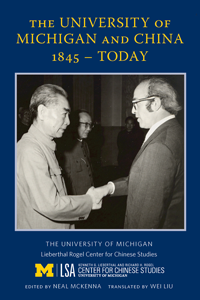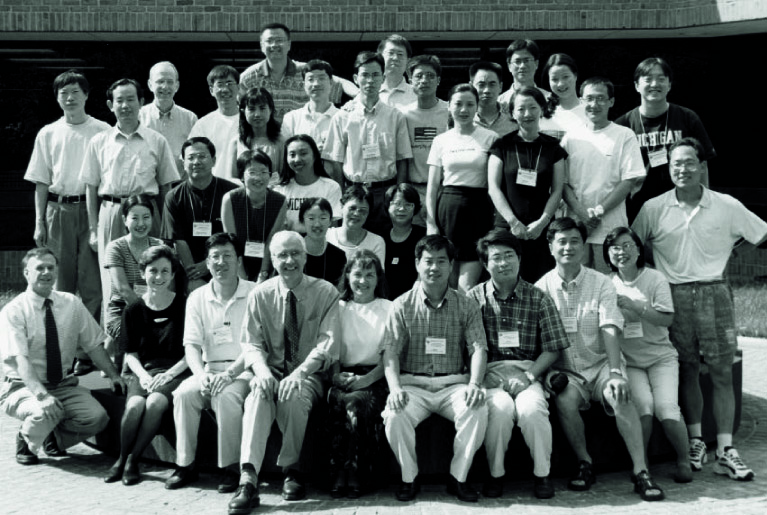
The University of Michigan and China 1845-Today
Skip other details (including permanent urls, DOI, citation information): This work is licensed under a Creative Commons Attribution-NonCommercial-NoDerivatives 3.0 License. Please contact [email protected] to use this work in a way not covered by the license.
For more information, read Michigan Publishing's access and usage policy.
Major Partnerships
Starting in 1979, new generations of Chinese students and scholars began to arrive in Ann Arbor. Enrollments have reached new levels, and Michigan is helping to train the next leaders in China’s universities and research institutes as well as in business, law, and other professions. Faculty members from China’s leading universities often take positions as visiting scholars at the University of Michigan’s schools and colleges. Delegations from leading Chinese universities continue to visit Michigan, and groups of U-M faculty, staff, and administrators continue to travel to China. New agreements are being forged.
Some of these collaborations include the following:

Beginning in 1982, the Bentley Historical Library has sustained an active program of exchanges and joint research projects with archival colleagues from China. While the first contacts were modest in scope, with a brief visit by five Chinese archivists to Ann Arbor, the relationship grew by 1999 into a formal exchange program with the State Archives Administration of China. The main focus of the accord is a biennial seminar on con-temporary issues in archival administration. Over the years, well over one hundred Chinese archivists have visited Ann Arbor for up to three weeks of daily seminars on modern archival methods. In alternate years, a small delegation of Bentley archivists travels to China to present lectures and visit a variety of national and local archives throughout China.
In 1995, the University of Michigan’s Institute for Social Research invited the Research Center for Con-temporary China of Peking University to become part of an international consortium of leading social and behavioral research centers. This network is collaborating to develop truly international social and behavioral science research to address complex global issues.
In 1997, the China Data Center was founded at the University of Michigan, serving as an international center for advancing the understanding of China. The China Data Center partners with several Chinese government agencies and companies in compiling and distributing statistical data about China. The China Data Center integrates historical, social, and natural science data in a geographic information system. The China Data Center promotes accessibility to data between China and the United States and develops cooperative endeavors with China.
In 2001, as part of the partnership between Michigan’s College of Engineering and Shanghai Jiao Tong University (SJTU), Michigan faculty began teaching in Shanghai, and through this the College of Engineering helped SJTU to transform its curriculum in a number of engineering fields.
Since 2002, Michigan Medicine faculty have worked with the China Medical Board to address topics in medical education at China’s leading medical schools.
In 2003, the Ford School of Public Policy established a faculty exchange program with the School of Public Administration at Renmin University in Beijing. The first group of Chinese civil servants to earn a master’s degree in public administration through the Ford School completed their degrees in 2004.
In 2005, the University of Michigan’s women’s Studies program and the Department of History of Fudan University began a collaboration to establish a new Institute for Gender Studies at Fudan, which facilitates graduate teaching, research, and exchange among gender studies scholars of the two universities. This program has carried out summer workshops in China to build the capacity of Chinese scholars to engage in gender studies.
In 2006, After several years of cooperation, the University of Michigan and Shanghai Jiao Tong University jointly founded the UM-SJTU Joint Institute. The UM-SJTU Joint Institute is an engineering college within SJTU where courses are taught in English; it is governed by a board of faculty and leaders from both institutions. Undergraduate and graduate degrees are offered in mechanical, electrical, and computer engineering, which are conferred by SJTU based on a curriculum adapted from the University of Michigan. Chinese students have the option to apply to Michigan and pursue a second degree in a different discipline as transfer students. The UM-SJTU Joint Institute has won a National Teaching Achievement Award and has been recognized as a Model of Higher Education Reform in China. The UM-SJTU Joint Institute is the first Chinese institute to win the Andrew Heiskell Award for innovation in International Education—one of the highest honors in international higher education.
Many of these partnerships have deepened in both substance and commitment. U-M faculty secured National Science Foundation funding to establish a new international Research Experiences for Undergraduates (iREU) site at the University of Michigan–Ann Arbor and Peking University (PKU) in Beijing for the summers of 2008–2010. Students from Michigan and Peking University participated in exchanges in both countries and published papers in the chemical, biological, and life sciences. Moreover, in March 2010, U-M and Shanghai Jiao Tong University launched two programs to jointly fund renewable energy and biomedical research projects involving investigators from both universities. The goal of the renewable energy program is to develop new technologies that reduce global carbon emissions and their impact on climate change. The biomedical collaboration will spur technological advances that improve -human health. This research partnership has continued to develop, bringing in new technical fields, including nanoscience and data science, and a new framework for the operation of joint research laboratories has been initiated. This partnership has been brought under the umbrella of the UM-SJTU Partnership Board that also governs the UM-SJTU Joint Institute.
In 2010, the University of Michigan Health System and Peking University Health Sciences Center launched their own Joint Institute, which sponsors high-impact collaborative research that leverages the unique strengths of each university to advance global health. The UMHS-PUHSC Joint Institute for Clinical and Translational Research established an exchange program among faculty members, medical residents, fellows, and students to further the cooperative exchange of ideas and expertise. The Joint Institute enables the two institutions to help each other translate research into medical practices that benefit patients all around the world.
The U-M School of Public Health (SPH) has an active relationship with China. In 2012, SPH leaders visited China and signed agreements with regional Centers for Disease Control in Shanghai, Tianjin, and Beijing and at Peking University School of Public Health to work together to address global public health problems. Most recently, in 2015 a memorandum of understanding to formalize research and program collaboration was signed by officials and leaders of SPH and the West China School of Medicine and Hospital at Sichuan University. This agreement codifies the friendship between U-M and Sichuan University and their commitment to address public health challenges together.
The University of Michigan’s Ross School of Business has also been an active part of the relationship between China and the University of Michigan. In 2012, officials from Ross and SJTU’s Antai College of Economics and Management launched a new partnership that created exchange opportunities for students of both Ross and Antai. In 2014, the Ross School of Business collaborated with one of the world’s largest banks, Industrial and Commercial Bank of China Limited (ICBC), to create a custom executive education program. Since then, ICBC executives have studied at Ross each year, partnered with U-M students, and visited American companies, all the while learning new business skills and gaining experience of the global economy.
In 2015, the Ross School of Business introduced the Master of Management–Shanghai Cohort, which gives engineering students from the UM-SJTU Joint Institute the opportunity to come to Ann Arbor for the nine-month Master of Management program. This partnership will make the programs at both U-M’s Ross School of Business and SJTU’s Antai College of Economics and Management more international through student and faculty exchange, and by giving students direct experience in the global economy.
In the fall of 2015, the Michigan Society of Fellows entered into an agreement with Tsing-hua University in Beijing to provide three three-year fellowships at Tsing-hua University. The purpose of the Tsinghua-Michigan Society of Fellows is to promote advanced scholarly inquiry in humanities and humanistic social science fields in a collaborative intercultural setting and to foster academic exchange between the Tsing-hua Institute for World Literatures and Cultures and the Michigan Society of Fellows, and at every level between Tsing-hua University and the University of Michigan.
Most recently, the University of Michigan, the Beijing Institute for Collaborative Innovation, and the Southern University of Science and Technology completed a memorandum of understanding with the aim of establishing a Global Collaboratory in Water Technology.
Funding for the $25 million, five-year partnership would be provided by the Beijing Institute, an innovation-focused organization founded by fourteen Chinese universities. The collaboratory is slated to have three sites: Ann Arbor, Beijing, and Shenzhen. The collaboratory’s goal is to identify technology gaps in water treatment and monitoring and to develop solutions to provide clean and safe water to the world’s urban environments. Leaders at the institutions expect to sign a full research agreement in 2017.



